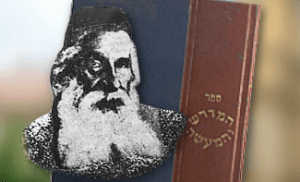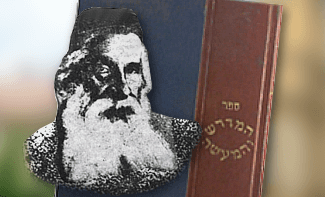
“Speak to the Bnei Yisrael, saying, ‘You must observe my Shabbosos, for it is a sign between Me and you…to know that I am Hashem Who sanctifies you.’”[2] [Sanctifies you – ] in the world to come, just like the holiness of Shabbos in this world. We thus learn that Shabbos is a bit like the holiness of olam habo. Similarly it says[3] “Mizmor shir l’yom HaShabbos.”[4]
Strange, you would think, that a chapter of Tehillim so closely identified with Shabbos by the text and with olam habo by Chazal does not seem to say anything about either of those topics!
There is more strangeness around the bend. A midrash[5] amplifies the enigma. “Adam meets up with Kayin. ‘How did your judgment go [for killing your brother]?’ Kayin replies, ‘I repented, and came to a compromise settlement.’ Adam is impressed. ‘So great is the power of teshuvah?!’ He broke out with Mizmor shir l’yom HaShabbos.” Again the connection between teshuvah and this section of Tehillim evades us.
An accepted principle about teshuvah has it that it is powerless to mitigate any offense against a human being without making amends to the injured party. This would seem to make it impossible to repent for murder. The victim is not available to propitiate; no conceivable compensation can begin to substitute for depriving him of the gift of life.
Unless, of course, death is not as final as some believe. If the soul of the victim is in a better place, it is at least conceivable that the contrition and remorse of the penitent can move the victim to forgive. Kayin’s negotiated settlement presupposes the existence of an olam habo!
What does this have to do with Tehillim 92? We begin with an observation. We are well aware of mishpatim and chukim within our mitzvah system. The former seem judicious – hence the word mishpat. They appeal to our sense of reasonableness. Not so the latter, whose logic evades us completely. Yet we obey both. We are not frustrated by the chukim, because we understand that our human grasp of things is limited, while Hashem’s is limitless. We trust in Him, that whatever He commands obeys a logic to which we are not yet privy.
What is true of mitzvos appears to be true about life, which also has its rules and regularity. Some of it makes sense. Some, however, does not. The fact that the genuinely righteous suffer while the evil prosper is not a mishpat of life. Rather, the frequency with which we see it occur makes it one of life’s chukim. Here, too, we calm our frustration at injustice by reminding ourselves of how much more information and perspective is available to the Creator – how He can balance needs past, present and future in ways that we cannot imagine. What appears to us to be cruel and unjust can really be positive and compassionate. If we had the bigger picture of all human needs, we would see the actual good in the apparent evil.
Mizmor and shir seem to be synonyms for “song.” They are not. My guess is that they are distinguished by the emotional state of the composer. A shir springs from a heart gladdened by obvious good. Its reason is apparent; it does not require penetrating comprehension to uncover the reason for the joy. There is a second kind of song. It starts off in quiet desperation, but ends in some insight – arrived at through examination and comprehension – that brings comfort and peace. This is called mizmor. There are several examples of this in Tehillim alone: perakim 6 and 9, for example, which deal with topics that are anything but intrinsically joyous. Chazal[6] note that the dirge about the destruction of the Temple should rightfully be called a kinah. It is called a mizmor because its foreboding storm clouds contain a silver lining.
If we are correct, then the ultimate mizmor is Shabbos itself. Imagine Adam created earlier than the sixth day. Witness to the endless explosions of creativity on each day of Creation, he would have become accustomed to them, and believed that there would be no end to them. When Shabbos began, Adam would have begun to mourn – for good reason! The marvelous display of Divine wisdom had ceased, not to be seen again. What tragedy!
Adam could not have known that HKBH created a wondrous world, exactly constructed for the needs of Man. Creation ended because its work was done – although much of the Divine wisdom remained hidden in what He had fashioned, to be discovered in the millennia that followed. For Adam to have understood this, he would have had to have access to all that Hashem Himself knew. This way beyond his ability – just like his inability to understand chukim.
The coda to the Creation story states,[7] “The heavens and earth were completed, and all their array.” In other words, all that Mankind would need for its journey was placed within that first Creation. Anything that would be useful in the future was contained with the original configuration. It would require no further modification. “G-d rested from His work,” because no more had to be added to it! “G-d blessed it and sanctified it.” His cessation could be seen as His turning His back to the world, to losing interest in its further development. But this was not so. His Shabbos rest was not a tragic cessation of creativity, but full of joy and light, blessing and holiness. We can understand why Chazal[8] say that “whoever davens and recites veyechulu (the “were completed” verses) becomes a partner with Hashem in Creation.” Specifically these verses turn Shabbos from a cessation of activity into a considered completion of activity.
We can find in this as well the reason why Chazal[9] promise that whoever delights in the Shabbos merits an inheritance without limits. When a person enjoys and delights in Shabbos, he indicates that he does not regard Hashem’s rest as a distressing end to His creativity. He regards the world thus created not as limited, but limitless in what it can provide for Man. He thus merits that he should see his personal stake in that world as being a source of limitless promise and joy.
Shabbos, then, turns all of our understanding of the world on its head. It allows us to see the bad turn to good, the darkness to light. Adam understood its role as a paradigm for all of existence. He composed a mizmor shir, a paean to Shabbos that announces that life is full of both joy that causes full throated celebration, as well as the more contemplative satisfaction of a sense that all in the end will be shown to have been part of a brilliant master plan. And at times, we can even discern enough that the latter transitions into the former – that mizmor becomes shir.
The Psalmist continues with an examination of some of the mysteries and contradictions of life: our inability to understand His ways; the success of the wicked; the light as well as the darkness. In all cases, the example of Shabbos itself readies us to contemplate what sometimes overwhelms us. Shabbos reminds us that G-d knew exactly what He was doing when He turned off the Divine spigot of creativity – and that we can now understand why this was a good thing. So too it tells us that all the tensions and contradictions are resolved within Him, even when we fail to understand how.
We can now return to one of our earlier sources with some additional insight. One of the anomalies that we learn to live with is that sin can become a vehicle for good. Chazal[10] tell us that when a person repents out of fear of punishment, his intentional sins are downsized, and are considered to be unintentional trespasses. If he repents out of love of Hashem, they become mitzvos! Kayin’s words can be taken in this vein. When Adam asked him what had become of his judgment, he responded that he had reached a “compromise settlement.” We know that he was not forgiven entirely. He was sent into exile, which is the same punishment that the Torah prescribes for the unintentional murderer. Even though his repentance was a half-baked one (the same midrash refers to it as false, an artifice), it was still valued by G-d. It saved his life.
Adam is amazed at the reach and power of teshuvah. He now realizes that it comes in two varieties. The weaker one reduces the effect of the sin; the stronger one transforms it into merit! He has uncovered another of life’s anomalies: sin becoming saintly. He was moved to compose the magisterial statement on the multitude of life’s puzzles and anomalies, Mizmor Shir L’Yom HaShabbos.


